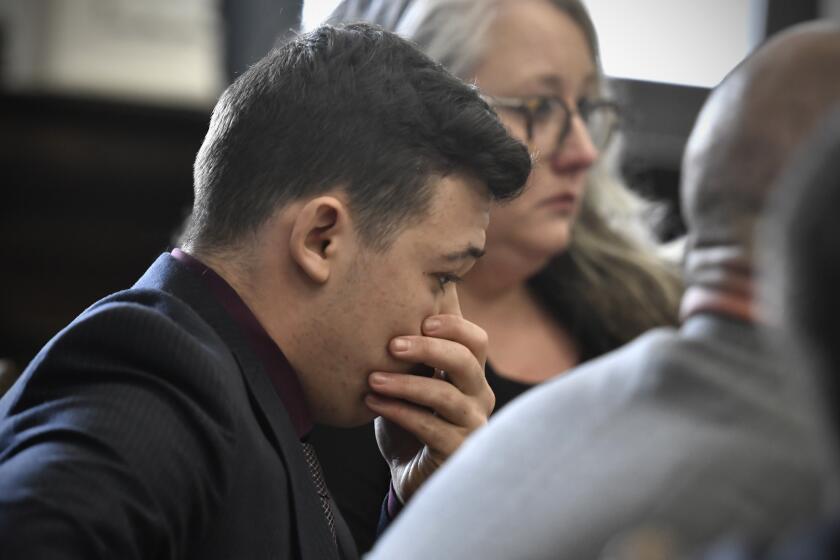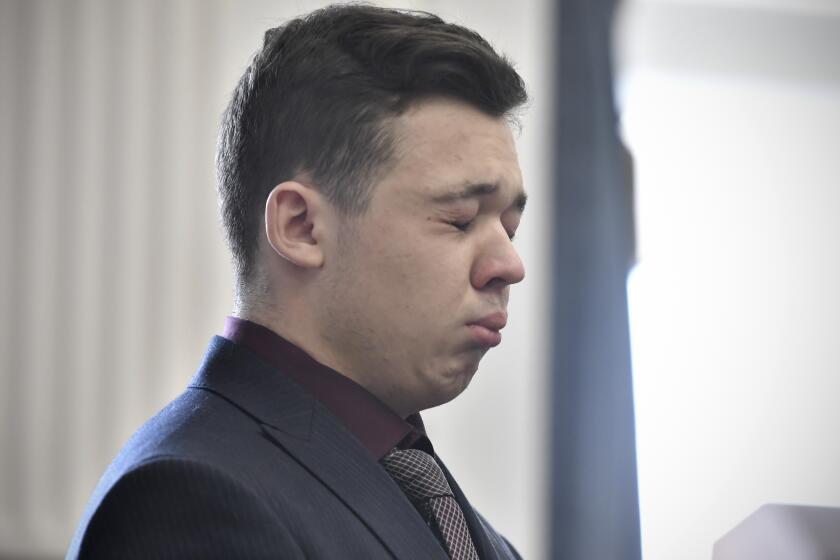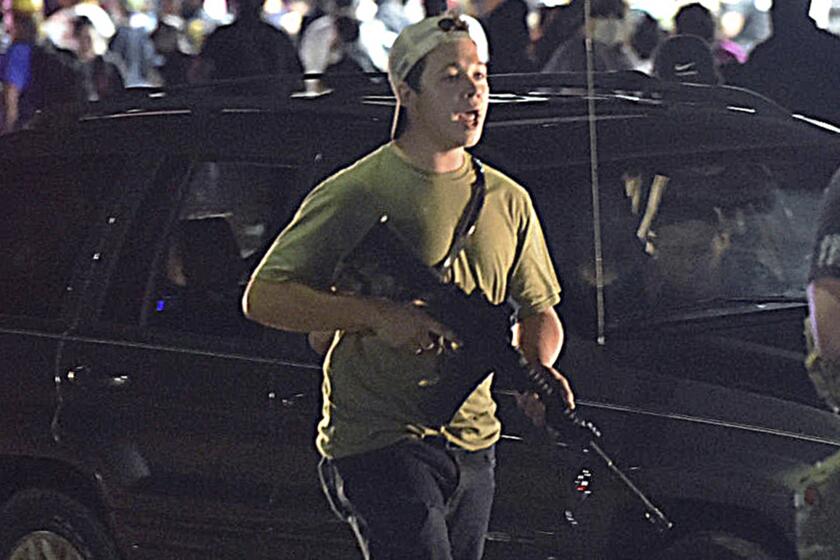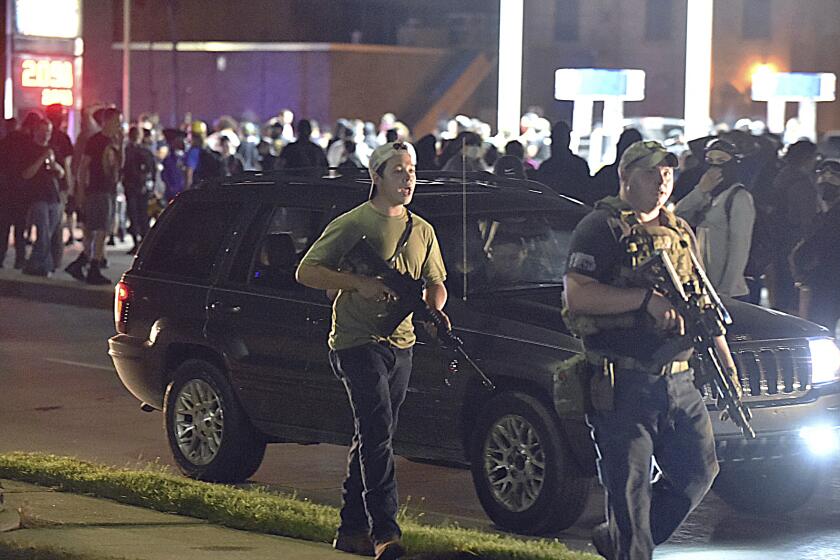Column: A week of chasing justice in two Americas
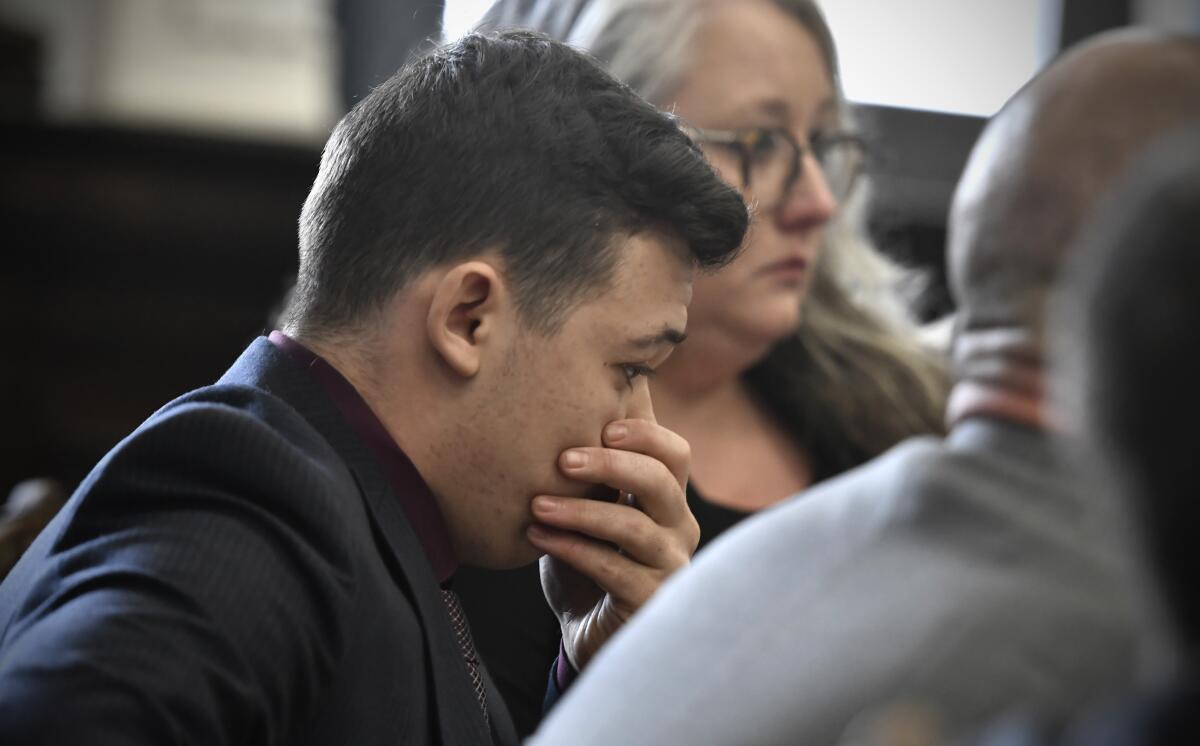
- Share via
During weeks like this, the pursuit of justice feels more like chasing clouds blindfolded.
Friday’s “not guilty” verdict in the Kyle Rittenhouse trial wasn’t altogether surprising — especially after Judge Bruce Schroeder said he wouldn’t allow the people Rittenhouse shot and killed to be called victims. But it still felt like a gut punch knowing the prosecution wasn’t allowed to show a video in which Rittenhouse reportedly said he wish he had a gun so he could shoot people two weeks before he went out and shot people.
Kyle Rittenhouse is found not guilty of all charges in the killing of two people during a protest last year in Kenosha, Wis.
I can’t help but juxtapose the outcome in the Rittenhouse case to that of the high-profile case of Julius Jones in Oklahoma.
On Thursday, Oklahoma Gov. Kevin Stitt commuted Jones’ death sentence to life imprisonment without possibility of parole — but with the condition that he would never be eligible to apply for or be considered for a commutation, pardon, or parole for the rest of his life. This despite the state’s Pardon and Parole Board recommending clemency with the possibility of the parole — before Stitt’s decision — because of serious doubts about the evidence against Jones.
I’m grateful Jones is alive, but it’s hard to see the governor’s order as just.
Also this week, Khalil Islam and Muhammad A. Aziz, two of the three men convicted for the 1965 assassination of Malcolm X, were exonerated. As the New York Times noted, “A 22-month investigation conducted jointly by the Manhattan district attorney’s office and lawyers for the two men found that prosecutors and two of the nation’s premier law enforcement agencies — the Federal Bureau of Investigation and the New York Police Department — had withheld key evidence that, had it been turned over, would likely have led to the men’s acquittal.”
The acquittal of Kyle Rittenhouse on all counts sends a chilling message about the acceptability of vigilantism.
Yes, their convictions have now been thrown out, but who will be held accountable for their wrongful incarceration?
Where is justice for Malcolm X?
Where is the justice for Islam, who died in 2009, and Aziz, who after spending decades in prison for a crime they didn’t commit, had to see themselves portrayed as murderers in books, television, and film? David Shanies, an attorney who teamed up with the Innocence Project to represent Aziz and the Islam family, said “the NYPD and FBI covered up a tremendous amount of evidence of their innocence, hiding it even from the District Attorney.”
Opinion Columnist
LZ Granderson
LZ Granderson writes about culture, politics, sports and navigating life in America.
And who will be held accountable for that?
Seems like no one.
This week the city of Aurora, Colo., agreed to pay the family of Elijah McClain $15 million to settle a civil rights lawsuit filed over his death by police. It is said to be the largest police settlement in its state’s history. The 23-year-old unarmed McClain was stopped by police as he walked down the street.
“I have a right to stop you because you’re being suspicious,” an officer can be heard saying on the body camera video. The slight, 143-pound McClain was placed in a chokehold. He passed out. Paramedics injected him with 500 milligrams of ketamine, an amount appropriate for someone north of 200 pounds. He fell into a coma. He was pronounced dead at the hospital.
The acquittal of Kyle Rittenhouse is a reminder that the nation’s pathway through its wrenching debate over race, policing and identity is neither straight, clear nor short.
This was all in August 2019. Only in September, two years after McClain’s death, were two police officers, a former officer and two paramedics charged with counts of manslaughter and negligent homicide. Had it not been for weeks of protests following the murder of George Floyd in 2020, charges may not have been brought.
Is this how justice is supposed to work?
Or is the $15-million settlement acknowledgment that justice doesn’t work for everyone?
Because in a week in which several high-profile cases all had various forms of conclusions, the only person who appears able to go on and live a full life is the 18-year-old who killed two people.
Will the Kyle Rittenhouse verdict send the wrong message?
Hours after the verdict, I received a fundraising email blast from “Free Kyle USA” that read, in part, “please, take all that positive energy I know you’re feeling and make an urgent donation to help us close this very ugly chapter in our lives.”
I’m sure from Rittenhouse’s perspective, this was an ugly chapter. However, for Black people who saw the photo of him earlier this year in a bar wearing a T-shirt that said “Free as F—,” as he posed for photos with members of the Proud Boys, flashing a “white power” sign, this is more than a chapter.
Yes, these are different cases with different judges and circumstances. Still, I can’t shake the feeling that they’re all part of the same story about two Americas.
More to Read
A cure for the common opinion
Get thought-provoking perspectives with our weekly newsletter.
You may occasionally receive promotional content from the Los Angeles Times.
